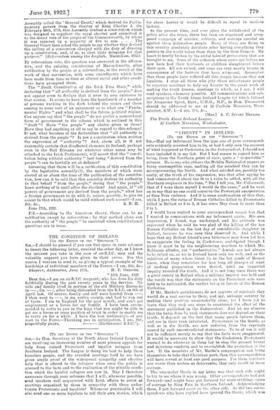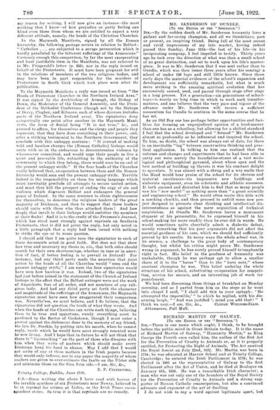"LIBERTY " IN IRELAND.
[To THE EDITOR OF THE " SPECTATOR.") SIR,—Had my informant been the type one of your correspond- ents evidently assumed him to be, or had I only seen the account of what happened at Cookstown in the Independent, I should not have included it in my list. But I had reason to regard him as being, from the Northern point of view, quite a " respectable " witness. He is one who abhors the Dublin Nationalist papers as being contemptible rags, making all the mischief they can by misrepresenting the North. And what satisfied me, possibly too easily, of the truth of his impression, was that after saying he had remonstrated about the 10 to 1 ratio he added, with all the Northern emphasis in his tone, " But I tell you, Mr. Culverwell, that if I were there myself I would do the same," and he went on to say that no one could conceive the Protestant exasperation at Sinn Fein violence. And it is some confirmation of this that, while I gave the ratio of Roman Catholics killed to Protestants killed in Belfast as 3 to 2, it has since May risen to more than 3 to 1.
I would have replied to your correspondent sooner but that I wanted to communicate with my informant again. His own impression, I found, was unchanged, and his attitude was expressed when he said he was glad of the killing of the ten Roman Catholics on the last day of considerable slaughter in Belfast, because lie was sure they deserved it. And while I hope that my Belfast friend's own bitterness may have led him to exaggerate the feeling in Cookstown, embittered though I knew it must be by the neighbouring murders to which Mr. Robinson alludes, yet " authoritative " denials are not always to be relied on, as we in Ireland know only too well, and as the relatives of many whose bones lie in the hot sands of Mespot know, when they remember for how long all charges of want of medical preparation were denied, until an impartial inquiry revealed the truth. And it is not long since there was a great outcry in Belfast when a military inquiry was held and the result was that the statements on the Protestant side were held to be unfounded, the verdict being in favour of the Roman Catholics.
If Mr. Marks's parishioners do not approve of reprisals they would do a real service to their, and my, unhappy country by making their position unmistakably clear, for I have yet to learn that they took any steps to counteract the effect of the statement published in the Independent. And let me observe that the harm done by such statements does not depend on their truth; it depends on the fact that many people believe them, and are in their turn infuriated. Protestants in the South, as well as in the North, are now suffering from the reprisals caused by such uncontradicted statements. To be of use it will not be sufficient merely to say that the facts were exaggerated. It would be necessary to show that the Cookstown Protestants wanted to do whatever in them lay to stop the present brutal and injurious vendetta and to re-establish the protection of the law. If the members of Mr. Marks's congregation can bring themselves to take that Christian part, then this correspondence will have served at least one good purpose. For these reprisals are worse than useless as deterrents; they only result in more outrage.
The unpopular thesis in my letter was that each side ought to try to see where it was wrong. Other correspondents had put forward—and might have put forward far more striking--cases of outrage by Sinn Fein in Southern Ireland. Acknowledging them, I put forward cases on the other side. As the two corre- spondents who have replied have ignored the thesis, which was
y reason for writing, I will now give an instance—the most striking that I know—of how prej udice or party feeling can blind ,even those from whom we are entitled to expect a very different attitude, namely, the heads of the Christian Churches. In the Maynooth Manifesto, signed by all the Roman hierarchy, the following passage occurs in relation to Belfast : " Catholics . . . are subjected to a savage persecution which is hardly paralleled by the bitterest sufferings of the Armenians." Curiously enough this comparison, by far the most exasperating and least justifiable item in the Manifesto, was not referred to in Mr. Fitzgerald's letter (p. 555), nor in the reply issued on behalf of the Protestants. It must have been pregnant for evil in the relations of members of the two religious bodies, and may have been in part responsible for the murders of Protestants in South Cork which took place soon after its publication.
To the Maynooth Manifesto a reply was issued as from " the Heads of Protestant Churches in the Northern Ireland Area." It was signed by the Archbishop of Armagh, the Bishop of Down, the Moderator of the General Assembly, and the Presi- dent of the Methodist Conference (though not by the Bishops of Derry, Clogher, and Kilmore, each of whose dioceses includes parts of the Northern Ireland area). The signatories deny categorically one point after another in the Maynooth Mani- festo, the form of denial being "It is not true," &c., and proceed to affirm, for themselves and the clergy and people they represent, that they have done everything in their power, and, after a striking testimonial to the Northern Government, they conclude with this unhappy sentence: " If instead of making wild and baseless charges the [Roman Catholic] bishops would unite with us in the endeavour to discountenance violence by whomsoever committed, and would urge their people to lire a quiet and peaceable life, submitting to the authority of the community to which they belong, there would soon be an end of the present unhappy strife." If the four heads of the Churches really believed that, co-operation between them and the Roman hierarchy would soon end the present unhappy' strife. Terrible indeed is the responsibility on them for using language which must inevitably preclude all attempts to secure united action, and must thus kill the prospect of ending the orgy of sin and violence which disgraces Belfast and endangers the general peace of Ireland. In the same sentence to claim righteousness for themselves, to denounce the religious leaders of the great majority of Irishmen, and then to suggest that these leaders should unite with those who thus attacked them! And how deeply that insult to their bishops would embitter the members of their flocks! And it is to the credit of the Freeman's Journal, which has stood most strongly against reprisals on Southern Protestants, that it did not print the reply, but only noted in a little paragraph that a reply had been issued with nothing to strike the eye or to rouse passion.
I should add that I am quite sure the signatories to each of these documents acted in good faith. But does not that show how true and necessary my thesis is, viz., that both sides should search for their own shortcomings, whether in tone or in asser- tion of fact, if better feeling is to prevail in Ireland? For instance, had any third party made the assertion that joint action by the heads of all the Churches would " soon end the present unhappy strife," I am sure the four signatories would have seen how baseless it was. Indeed, two of the signatories rad just before joined in the statement of the Church of Ireland bishops to the effect that the Belfast outrages were not the work of Anarchists, foes of all order, and not members of any reli- gious body. And had any third party set forth the character and magnitude of the sufferings of the Armenians, the Maynooth signatories must have seen how exaggerated their comparison was. Neverthe'ess, we must believe, and I do believe, that the signatories did not question the truth of what they wrote. And when the heads of the Churches can write such things, believing them to be true and opportune, surely everything must be . pardoned to the Rector of Cookstown, though I must enter a protest against the dishonour done to the memory of my friend, the late Dr. Starkie, by putting into his mouth, when he cannot reply, words which he would have most strongly resented were he now living. And I hope that in•future he will not think that there is " lip-smacking " on the part of those who disagree with him when they write of matters which should make every Irishman hang his head in shame. May I add that I would not write of any of these matters in the Irish papers because they would only inflame, nor to any paper the majority of whose readers are given to over-estimate the faults on the Ulster side and minimize those on the Sinn Fein side.—I am, Sir, &c.,
Trinity College, Dublin, 'June 17th.
E. P. CULVERWELL.
P.S.—Since writing the above I have read with horror of the terrible murders of six Protestants near Newry, believed to be in repriOal for crimes at Lislea, so the Irish Times corre- spondent states. So true it is that reprisals are no remedy.



































 Previous page
Previous page